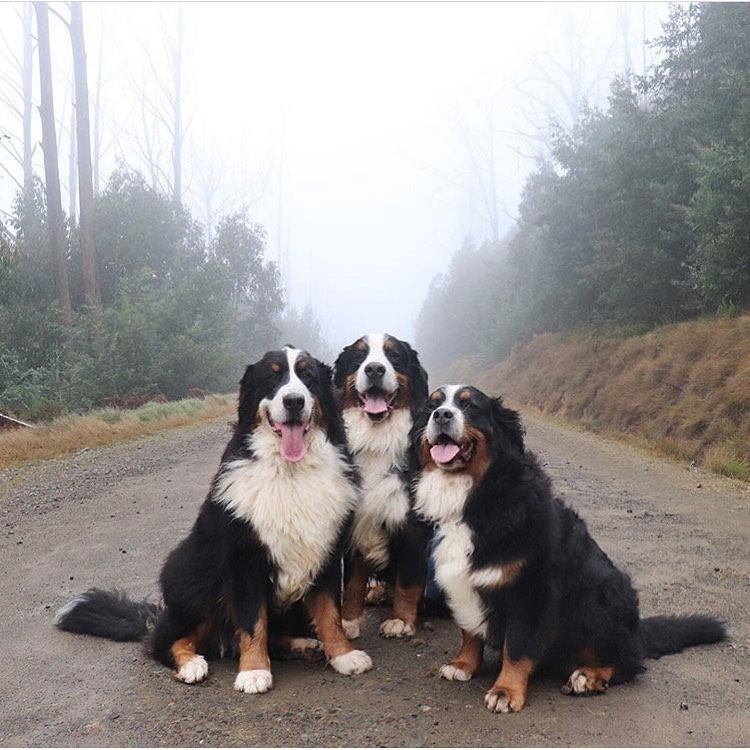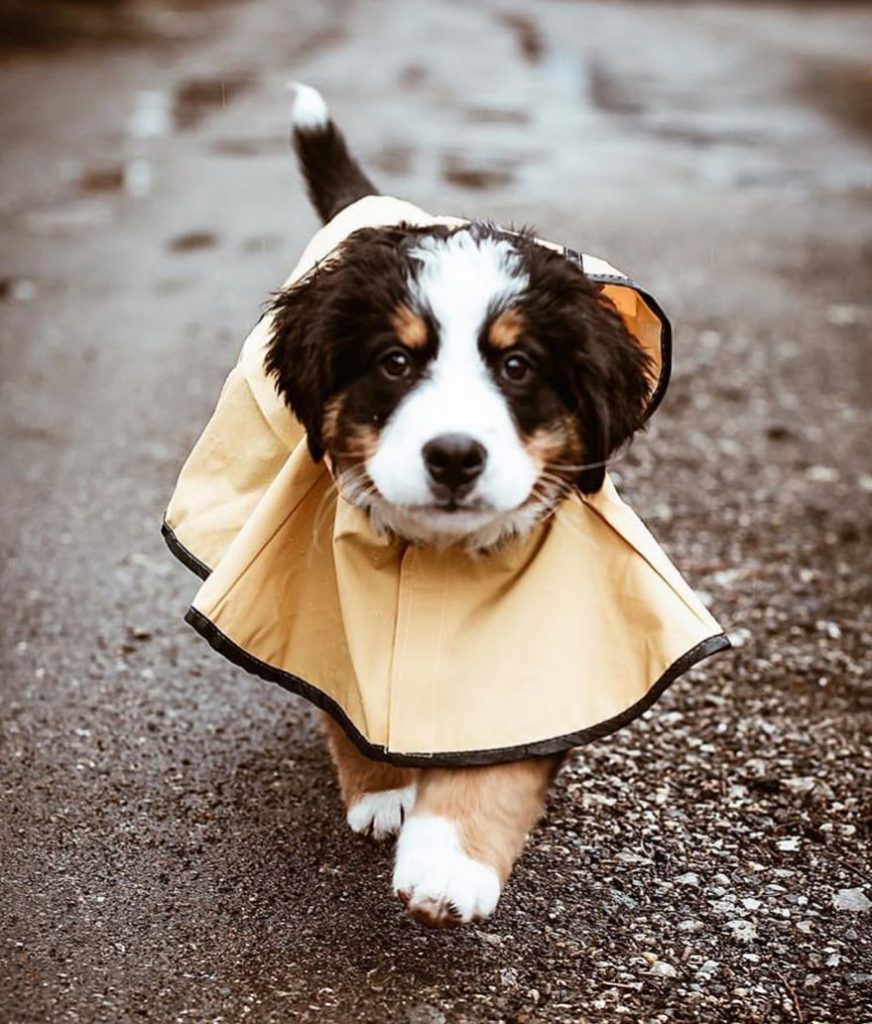Key Milestones in Bernese Mountain Dog Training

Early Development: 3-12 Weeks
The journey of training a Bernese Mountain Dog begins in their early developmental stages, from 3 to 12 weeks. During this critical period, puppies go through rapid mental and physical growth. Focusing on gentle socialization and introducing them to different people, environments, and mild stressors are essential. This stage is also ideal for beginning basic training cues like ‘sit,’ ‘stay,’ and ‘come,’ using positive reinforcement techniques. The goal is to nurture a confident, well-adjusted puppy, ready to progress into more structured training.
Building Foundations: 4-6 Months
As your Bernese Mountain Dog enters the 4 to 6-month range, they’re more receptive to structured training. This is the time to establish a routine with regular training sessions focusing on basic obedience commands. Consistency in training and reinforcement is crucial. This period is also ideal for starting leash training, essential for larger breeds like Bernese Mountain Dogs. It’s a time to reinforce potty training and to continue socializing your puppy in various settings.
Advanced Skills: 7-12 Months
From 7 to 12 months, your Bernese Mountain Dog is ready to embark on more advanced training. This phase includes reinforcing the commands learned in the foundational stage and introducing more complex commands and behaviors. Training should also focus on strengthening the bond between you and your dog, ensuring they respond reliably in different situations. It’s a great time to begin agility training or other activities that challenge their mind and body, providing a well-rounded development.
Fundamental Training for Your Bernese
Basic Command Training
Basic command training forms the cornerstone of your Bernese Mountain Dog’s obedience. It includes teaching essential commands like ‘sit,’ ‘stay,’ ‘come,’ ‘heel,’ and ‘down.’ These commands foster good behavior and ensure your dog’s safety in various situations. Use positive reinforcement like treats and praises to encourage and reward your dog. Remember, patience and consistency are vital in achieving successful outcomes.
Leash Training Techniques
Leash training is vital for a breed like the Bernese Mountain Dog, known for their size and strength. Start with short, frequent sessions in a distraction-free environment. Use a suitable leash and harness that provide control without discomfort. Introduce your dog to walking beside you, gradually progressing to more crowded or stimulating environments. The aim is to have a dog that walks calmly by your side, regardless of distractions.
Housebreaking and Potty Training
Housebreaking is an essential part of your dog’s early training. Establish a consistent routine for meals and bathroom breaks. Use specific cues and take your dog to the same spot each time for elimination. Reward them immediately after they’ve done their business in the right place. Remember, accidents will happen; it’s essential to be patient and avoid punishment, as it can lead to fear and anxiety.
Fundamental Training for Your Bernese
Basic Command Training
Basic command training is essential in shaping a well-behaved Bernese Mountain Dog. This training phase involves teaching your dog fundamental commands like ‘sit,’ ‘stay,’ ‘come,’ ‘heel,’ and ‘down.’ These commands are not just about obedience; they are crucial for your dog’s safety in various scenarios. The training process should be consistent, using positive reinforcement methods such as treats and verbal praises to encourage and reward your dog. Remember, the key to successful command training is patience and regular practice. Start with short training sessions and gradually increase their duration as your dog becomes more adept. Training in different environments is essential to ensure your dog responds reliably regardless of distractions.
Leash Training Techniques
Leash training is crucial for Bernese Mountain Dogs, a breed known for their size and potential strength. Effective leash training techniques include:
- Start Early: Begin leash training when your puppy is comfortable wearing a collar or harness.
- Choose the Right Equipment: Use a sturdy leash and a comfortable harness or collar. Avoid using choke chains or prong collars.
- Short, Frequent Sessions: Keep training sessions short but frequent, focusing on positive experiences.
- Teach to Walk Beside You: Encourage Bernese to walk beside you, not pulling ahead or lagging. Use treats and verbal cues to guide them.
- Introduce Distractions Gradually: Once your dog is comfortable walking in a quiet environment, gradually introduce them to more crowded or stimulating areas.
- Consistency is Key: Be consistent with commands and rewards. Use the same cue whenever you want your dog to walk beside you.
- Positive Reinforcement: Reward calm and obedient behavior with treats, praise, or playtime.
Leash training is about building a trusting relationship where your Bernese Mountain Dog understands and respects the boundaries while walking. It ensures safe and enjoyable walks for both you and your dog.

Housebreaking and Potty Training
Successfully housebreaking a Bernese Mountain Dog requires patience, consistency, and a straightforward routine. Here are the key steps in this process:
- Establish a Routine: Dogs thrive on routine. Set specific times for feeding, play, and potty breaks.
- Choose a Designated Potty Area: Select a specific area outside for your dog to use. Consistently taking them to this spot helps them associate it with bathroom breaks.
- Use Consistent Cues: Introduce a command or cue whenever you take your dog out for a potty break.
- Reward Success: Immediately praise or give a treat when your dog successfully eliminates in the designated area.
- Supervision and Confinement: Keep a close eye on your dog indoors to prevent accidents. Use crates or gates to confine them when unsupervised, as dogs typically avoid soiling their sleeping area.
- Accident Management: If an accident occurs, clean it thoroughly to remove odors. Avoid punishing your dog, as it can lead to fear and confusion.
- Gradual Freedom: As your dog becomes more reliable, gradually increase their freedom around the house.
Remember, every dog learns at their own pace. Consistency, positive reinforcement, and patience are essential to successful housebreaking and potty training.
Socializing Your Bernese Mountain Dog
Socialization is critical to training your Bernese Mountain Dog, shaping their behavior and temperament as they grow. A well-socialized dog is likelier to be confident, calm, and friendly in various situations. Start socialization early, ideally during the puppy stage, when your dog is most receptive to new experiences.
Introduce your Bernese Mountain Dog to different people, including children, adults, and older people, ensuring a range of interactions. This exposure helps them become comfortable around various individuals, reducing anxiety or fear in social situations. It’s also essential to familiarize your dog with other animals, especially other dogs. Dog parks or puppy classes can be excellent environments for this, but ensure these interactions are controlled and positive.
Exposing your dog to different environments is another crucial element of socialization. Take them to parks, busy streets, and calm rural areas. This exposure helps your dog adapt to different sounds, sights and smells. During these outings, observe your dog’s reactions and comfort levels, gradually increasing exposure as they become more at ease.

Remember, socialization is not just about exposure but also about positive association. Pair new experiences with rewards, such as treats or praise, to create positive associations. Be patient and observe your dog’s body language, backing off if they seem overwhelmed or scared and trying again later.
A well-socialized Bernese Mountain Dog is likelier to lead a happy, well-adjusted life, being both a joy to their family and a well-behaved community member.
Expert Tips and Strategies for Training
Like any breed, training a Bernese Mountain Dog comes with unique challenges and rewards. Expert trainers often emphasize the importance of understanding the breed’s characteristics: they are intelligent, sensitive, and respond well to gentle, consistent training methods.
One key strategy is to start training early. Puppies have a remarkable ability to learn quickly, but they also develop habits early on. Starting training sessions when your Bernese Mountain Dog comes home helps establish good behavior from the outset. Short, frequent training sessions are more effective than longer, less frequent ones, as they keep the dog engaged and prevent fatigue or boredom.
Another crucial aspect is understanding and leveraging the power of positive reinforcement. With their sensitive nature, Bernese Mountain Dogs respond exceptionally well to rewards such as treats, praise, and play. This approach makes training more enjoyable for the dog and strengthens the bond between you and your pet.
Patience is a virtue in dog training. Bernese Mountain Dogs may sometimes test your limits, but remaining calm and consistent is critical. Avoid harsh disciplinary methods; redirect unwanted behavior towards more acceptable alternatives instead. This approach helps build trust and encourages your dog to learn the desired behaviors more effectively.
Understanding the breed’s temperament and using these expert strategies can make training a rewarding experience for you and your Bernese Mountain Dog.
The Importance of Consistency in Training
Consistency is a cornerstone in the successful training of a Bernese Mountain Dog. Here’s why it’s vital:
- Builds Routine: Dogs, especially Bernese Mountain Dogs, thrive on routine. Consistent training helps establish a sense of predictability and security, making learning more accessible for them.
- Reinforces Learning: Repeating the same commands and rewards ensures your dog understands their expectations. This repetition solidifies their learning and behavior.
- Prevents Confusion: Inconsistent commands or rewards can confuse your dog, leading to mixed responses. Consistency in your approach ensures that your dog clearly understands the desired behavior.
- Strengthens Bonds: Consistent training routines deepen the bond between you and your Bernese. It builds trust and mutual respect, which are crucial for a harmonious relationship.
- Facilitates Better Behavior: A dog trained with consistent methods is likelier to exhibit good behavior at home, in public, and in unfamiliar environments.
Remember, consistency in training encompasses not just the commands and the rewards but also the tone of voice, body language, and training schedule. A consistent approach across all these aspects makes training more effective and enjoyable for you and your Bernese Mountain Dog.
Positive Reinforcement Methods
Positive reinforcement is a powerful method in training Bernese Mountain Dogs. Key techniques include:
- Treats: Reward good behavior with tiny, tasty treats.
- Praise: Use enthusiastic verbal praise to reinforce desired actions.
- Playtime: Use their favorite toys or games to offer play as a reward.
- Petting and Affection: Show physical affection, like petting or gentle rubbing, as a reward.
Using these positive reinforcement methods encourages good behavior and strengthens the bond between you and your dog, making training more enjoyable and effective.
Keeping Training Sessions Engaging
It’s crucial to keep training sessions engaging and dynamic to train a Bernese Mountain Dog effectively. This involves varying the activities and challenges to maintain the dog’s interest. Incorporating play into training can make learning more enjoyable and less monotonous. Training the dog in different environments to expose it to various stimuli is beneficial, ensuring it remains focused and adaptable. Short, frequent sessions are preferable, as long training can lead to losing interest. Keeping a positive and energetic attitude during these sessions will encourage your Bernese to participate eagerly, making the training process more rewarding for both.
Communicating Clearly with Your Bernese
Effective communication is vital when training a Bernese Mountain Dog. This breed is sensitive to tone and body language, making it essential to be clear and consistent in your signals and commands. Pair simple, distinct commands with consistent gestures to reinforce understanding. Be patient and avoid raising your voice, as Bernese Mountain Dogs can become anxious or unresponsive to harsh tones. Clear, calm, and consistent communication helps build trust and understanding, enabling your dog to learn effectively and strengthen the bond between you and your pet.
Patient and Understanding Training Approaches
Patience and understanding are essential in training a Bernese Mountain Dog. These gentle giants respond best to calm and nurturing guidance. Recognizing that each dog learns at its own pace is crucial. Showing patience during training sessions, especially when your dog struggles with a new command or concept, is essential. Understanding their individual needs and adapting your training methods accordingly can significantly enhance the effectiveness of the training process. Remember, a patient and empathetic approach not only aids in better learning but also strengthens the emotional bond with your dog.
Advanced Socialization Techniques
For advanced socialization of your Bernese Mountain Dog:
- Group Training Classes: Participate in group training classes for diverse social interactions.
- Doggy Playdates: Arrange regular playdates with other dogs.
- Public Exposure: Regularly visit dog-friendly public places like parks and cafes.
- Introduce them to different environments: Expose them to various settings, such as beaches, hiking trails, and urban areas.
- Socialization Challenges: Gradually introduce more challenging social situations, like larger crowds or noisier environments.

Redirecting and Correcting Unwanted Behaviors
Redirecting and correcting unwanted behaviors in a Bernese Mountain Dog involves understanding the cause of the behavior and addressing it positively. Instead of punishment, redirect your dog’s attention to a desired behavior or activity. For example, if your dog cheats on something inappropriate, offer them a chew toy instead. Consistency is critical in this approach. It’s also beneficial to preemptively manage situations that might lead to unwanted behaviors, providing appropriate outlets for their energy and curiosity.
Setting Realistic Training Goals
In setting training goals for your Bernese Mountain Dog:
- Start with Basic Commands: Focus on fundamental commands before advancing.
- Consider Your Dog’s Age and Temperament: Set age-appropriate goals and adjust for your dog’s unique personality.
- Gradual Progression: Advance to more complex tasks only after mastering basics.
- Customized Goals: Tailor goals to your dog’s strengths and weaknesses.
- Regular Assessments: Regularly evaluate progress and adjust goals as needed.
Prohibiting Punishment-Based Training
Avoiding punishment-based training is crucial in building a positive and trusting relationship with your Bernese Mountain Dog. Such methods can lead to fear, anxiety, and aggression, damaging the bond between you and your dog. Instead, focus on positive reinforcement and understanding to guide your dog’s behavior. Encourage and reward desired behaviors, and use redirection and gentle correction for undesired ones. Creating a safe and supportive environment for learning is critical to a happy and well-behaved dog.
Mastering Essential Commands
Mastering essential commands such as ‘sit,’ ‘stay,’ ‘come,’ ‘heel,’ and ‘down’ is fundamental in Bernese Mountain Dog training. These commands form the basis of good manners and obedience, essential for a well-behaved dog. Consistent practice, patience, and positive reinforcement are crucial in teaching these commands. Each command serves a practical purpose in daily life and ensures your dog’s safety in various situations. Regular reinforcement of these commands in different environments helps ensure your dog responds reliably, regardless of distractions.
Exploring Online Training Courses for Bernese Mountain Dogs
When exploring online training courses for your Bernese Mountain Dog:
- Research Thoroughly: Look for courses tailored to large breeds or Bernese Mountain Dogs.
- Check Credentials: Ensure the trainers have credible qualifications and experience.
- Interactive Content: Choose courses that offer interactive elements for practical learning.
- Flexibility: Look for courses that offer flexibility to fit your schedule.
- Community Support: Consider courses that provide access to a community or forums for additional support.
Understanding Your Bernese Mountain Dog’s Diet
Understanding your Bernese Mountain Dog’s diet is critical for overall health and training success. A well-balanced diet supports their physical needs, especially considering their size and energy levels. Ensure their diet includes the right balance of proteins, carbohydrates, fats, vitamins, and minerals. Pay attention to portion sizes and feeding schedules to prevent overfeeding, which is particularly important for large breeds prone to weight issues. Regular consultations with a veterinarian can help tailor the diet to your dog’s specific needs, age, and activity level.
Bernese Mountain Dogs in Family Settings
Bernese Mountain Dogs in Family Settings:
- Teach Children Dog Etiquette: Educate children on interacting safely and respectfully with dogs.
- Supervised Interactions: Always supervise interactions between your dog and children.
- Include in Family Activities: Make your dog a part of family activities to foster bonding.
- Personal Space: Teach everyone to respect the dog’s space and resting times.
- Consistent Rules: Ensure everyone in the family follows the same rules and commands as the dog.

Conclusion: Training Your Bernese Mountain Dog
In conclusion, training your Bernese Mountain Dog requires patience, consistency, and understanding. These gentle giants respond well to positive reinforcement and thrive in a nurturing environment. Remember, each dog is unique, and it is critical to adapt your training methods to fit their personality and needs. With dedication and the right approach, training your Bernese Mountain Dog can be an enriching experience, resulting in a well-behaved, happy pet and a strong, enduring bond between you and your dog.
